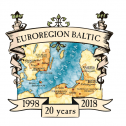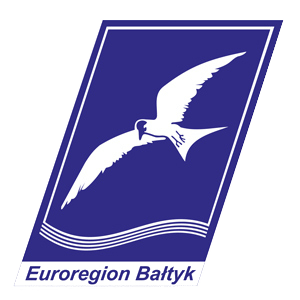About Euroregion Baltic
The idea of establishing the Euroregion come almost simultaneously among politicians, economic activists in south-eastern Sweden and north-eastern Poland. The organizational work lasted very shortly, the first conference was devoted to the possibilities of establishing the Euroregion (under the working name "Jantar"), held at the turn of February and March 1997 in Malbork, and on February 22, 1998, the Agreement on the establishment of the Baltic Euroregion was signed.

The idea of establishing the Euroregion come almost simultaneously among politicians, economic activists in south-eastern Sweden and north-eastern Poland. The organizational work lasted very shortly, the first conference was devoted to the possibilities of establishing the Euroregion (under the working name "Jantar"), held at the turn of February and March 1997 in Malbork, and on February 22, 1998, the Agreement on the establishment of the Baltic Euroregion was signed.
The Euroregion Baltic is one of the largest organizations of this type in Europe in terms of the number of participating Parties, the area and people living in these regions. The territory of the Euroregion in Poland is the Pomeranian and Warmian-Masurian regions, in Lithuania there is Klaipeda and Klaipeda County, in Sweden, there are provinces of Blekinge, Kalmar, Kronoberg, in Denmark the island of Bornholm.
The Euroregion Baltic has a self-governmental character, representatives of self-government and state authorities participate in the works of the Euroregion. The organizational structure is typical for Euroregions, the highest body is the Executive Board, it is appointed by the Presidium from among its members, the work of the Presidium is managed by the President of the Euroregion. The Board debates during formal meetings which may be ordinary or extraordinary. The meetings are held in English and in public unless the Board decides otherwise. Ordinary meetings must take place at least three times a year and they are summoned by the ERB President. Extraordinary meetings may take place at any time decided upon by the Board. Ordinary meetings shall be scheduled in the biennial action plans approved by the Board together with the change of the President and shall be hosted alternatively by all the member organisations.
Within the Euroregion, there are National Secretariats located in: Elbląg (Poland), Klaipeda (Lithuania), Ronne (Denmark) or rotating in Karlskrona, Kalmar, Växjo (Sweden). The Euroregion Council made a very important decision by establishing, from 1 July 2004, the Permanent International Secretariat of the Euroregion, which operates within the structure of the Polish Secretariat in Elbląg. The Permanent International Secretariat is funded by each of the Parties and is the first joint financial undertaking within the Euroregion. The Euroregion Baltic has very high hopes for increasing the level of cooperation by strengthening the internal cooperation network and launching external information about the works and achievements of the Euroregion. The Polish side in the Euroregion Baltic is made up of the Marshals of Pomerania and Warmia and Mazury as well as the members of Association of Communes, which includes member communes from these voivodeships.
As an organization which in its statute mentions, inter alia, supporting activities aimed at improving the living conditions of people living in the border area, facilitating mutual contacts, or bringing local communities together, it very well fulfils the priority of cross-border cooperation.

Polish side:
Pomorskie and Warmińsko-Mazurskie voivodships, Municipalities from Association
Lithuanian side:
Klaipeda and Klaipeda County
Swedish side:
Blekinge, Kalmar, Kronoberg regions
Danish side:
Bornholm Island
The most important general-regional events that Euroregion Baltic participated in past years from the initiative of the Polish side:
- Annual art competitions for children and teenagers entitled "We are from the sea". Every year, about 2,000 works were submitted, incl. from Poland, Russia and Lithuania.
- International ecological camps for young people in Piaski (Green School). Classes were conducted in English, the participants were young people from the ERB area.
- Participation in the Tourism Fair.
- Numerous sporting events, incl. Youth Sports Games of the Baltic Euroregion.
Please visit the website of the Euroregion Bałtyk network.
